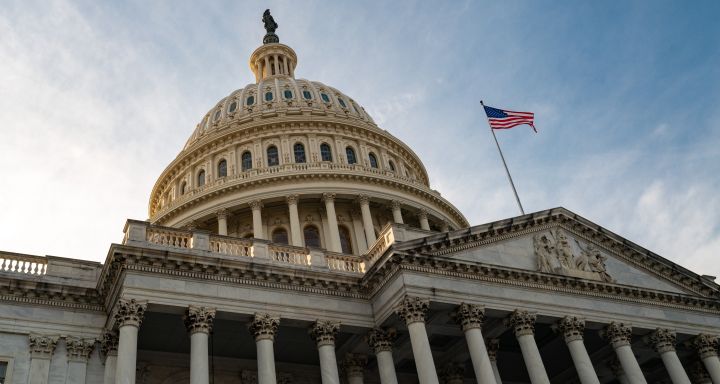US President Donald Trump has imposed sweeping global tariffs, including a 10% baseline levy on all imports into the US, which came into force last week. But do UK local authorities have anything to worry about?
 Since announced, Trump’s tariffs have sparked a stock market rout, deepening further today after the president signalled he would not back down from his aggressive trade policies. As markets opened this morning, the FTSE 100 index fell sharply, dropping nearly 6%, while the S&P 500 has been experiencing volatile trading, following a dismal first quarter of 2025.
Since announced, Trump’s tariffs have sparked a stock market rout, deepening further today after the president signalled he would not back down from his aggressive trade policies. As markets opened this morning, the FTSE 100 index fell sharply, dropping nearly 6%, while the S&P 500 has been experiencing volatile trading, following a dismal first quarter of 2025.
In addition to market volatility, economists believe the tariffs will inevitably push up inflation in the US. This, in turn, could result in a prolonged period of elevated interest rates, as the Federal Reserve, the US central bank, is mandated to act to bring inflation under control.
Deborah Cunningham, chief investment officer of global liquidity markets, senior portfolio manager and executive vice-president at Federated Hermes, stated that tariffs “usually produce inflation and higher prices”. The short-term outlook is “looking inflationary”, she added, explaining that “tariffs and immigration – they are always inflationary; inflationary from a wage standpoint and scarcity of goods,” during Room151’s Monthly Online Treasury Briefing last month.
LATIF 2025 | Treasury Management | S151 Summit | Place-based investment
While Trump has been hoping for rate cuts from the Federal Reserve, rising inflation expectations make that increasingly unlikely. And even if rates were reduced, it remains unclear whether that would be enough to stabilise the markets.
Higher borrowing costs and more expensive goods and services could lead to an economic downturn in the US, with potential knock-on effects in the UK. Sidhant Mehta, investment strategist at CCLA Investment Management, warned earlier this year that tariffs are harmful for US bonds, “but given the global nature of the market, spillover effects to the UK are completely possible”.
Charlotte Ryland, head of investment at CCLA, echoed this point: “Tariffs are stagflationary. They lower growth and raise prices in the short term. Stagflation is bad for risk assets, both equities and bonds.
“However, our current view is there is enough cushion in US growth to avoid recession assuming the international reaction remains restrained, and a full trade war is averted. If that changes we would expect further downside for equities and rate cuts which would be supportive for index linked bonds.”
US bonds fell sharply on Friday afternoon, a sign that investors are offloading assets they can sell, rather than those they want to sell, to shore up gaps elsewhere in their portfolios. Gold, typically considered a safe haven asset during crises, also fell sharply in the final hours of last week.
Although the trend in US bonds has since reversed, gold has yet to recover. In addition, some observers have warned that investors may be adopting similar positions, increasing the risk of a sudden worsening of the crisis especially if liquidity dries up.
Borrowing risk and uncertainty
The prospect of interest rates staying higher for longer is likely unwelcome news for UK local authorities, many of which have opted for short-term borrowing strategies. This could expose councils to refinancing risks, especially if rates elevate.
However, David Blake, director at Arlingclose, noted that: “The market is pricing in lower economic activity, lower growth and lower rates. Which will prevail? Hard to say, but don’t have all your eggs in one basket …
“Lower rates [are] a risk to net investors, while higher rates [are] a risk to net borrowers,” he added.
Ultimately, uncertainty is the key risk for local authorities. If inflation rises, followed by further interest rate hikes, councils with maturing borrowing face a big decision whether to maintain a short-term approach and continue to wait it out or lock into Public Works Loan Board (PWLB) rates.
However, for local authorities, there was a significant drop in shorter gilt yields from Thursday, which filtered through to PWLB rates. Councils with a substantial borrowing requirement this year may have taken advantage of this window.
According to the Debt Management Office, current rates on a 10-year PWLB loan stand at 4.94%, while the rate for a 20-year loan is 5.41%.
Impact on investments
On the investment side, rising inflation directly affects Money Market Funds (MMFs), where many local authorities hold their cash.
“If inflationary trends are sticky, they are keeping at higher rates, you are going to see interest rates staying above that. Your goal is to have some return in the short-term rate market from an investment standpoint beyond where inflation lies.
“Inflation goes, so does rates in the money markets, and ultimately the impact from a return standpoint for investors is direct,” said Cunningham.
In Europe, stocks also tumbled this morning, with the Stoxx Europe 600 index down 5.7%. Germany’s Dax fell 6.4%, having briefly plunged by more than 10% at the open. Japan’s Nikkei 225 dropped more than 7% in early trading.
This sell-off in equity markets could push more investors towards perceived “safe” assets, such as MMFs. Indeed, Ben Funnell, head of investment solutions at CCLA that the manager has reduced its exposure in the US over the last 12 months and increased exposure in Europe. We have also cut the equity weight in our multi-asset funds recently, specifically on trade war fears, reinvesting in gilts and cash.
However, there are potential downsides to this shift, Cunningham explained: “Parking funds in a safer vehicle, in MMF rather than going into the equity market, may result in a little bit [of] strain in the context of spreads in the marketplace and in liquidity in the market space, but overall [it’s] being positive from a money market trend.”
The main thing to watch out for here is that stock markets and bond markets are usually inversely correlated. However, the trend seen last Friday showed a direct correlation, and if that continues, it could spell trouble for MMFs and any highly liquid strategy.
________________________________________________________________________________________________
FREE weekly newsletters
Subscribe to Room151 Newsletters
Follow us on LinkedIn
Follow us here
Monthly Online Treasury Briefing
Sign up here with a .gov.uk email address
Room151 Webinars
Visit the Room151 channel


